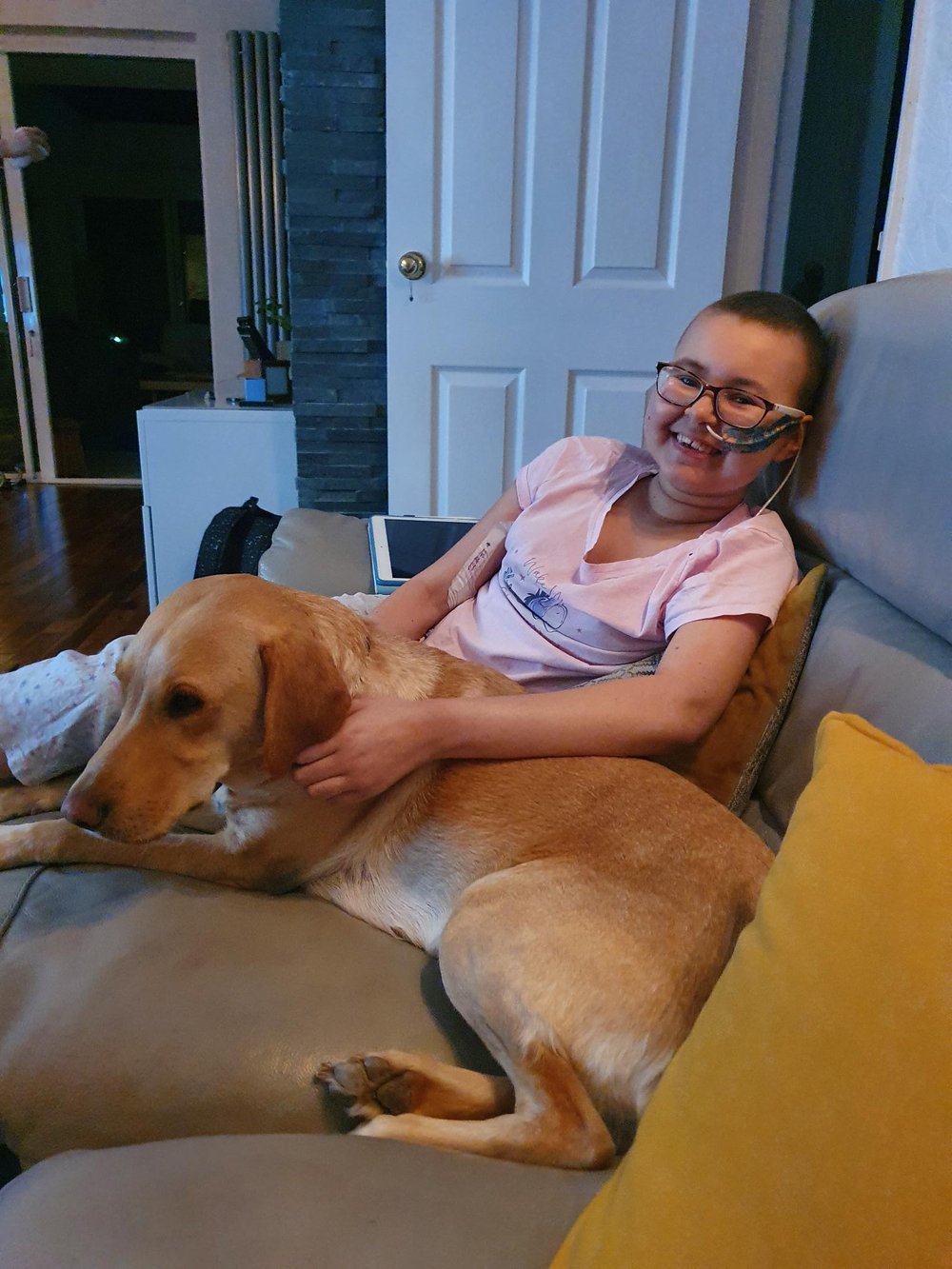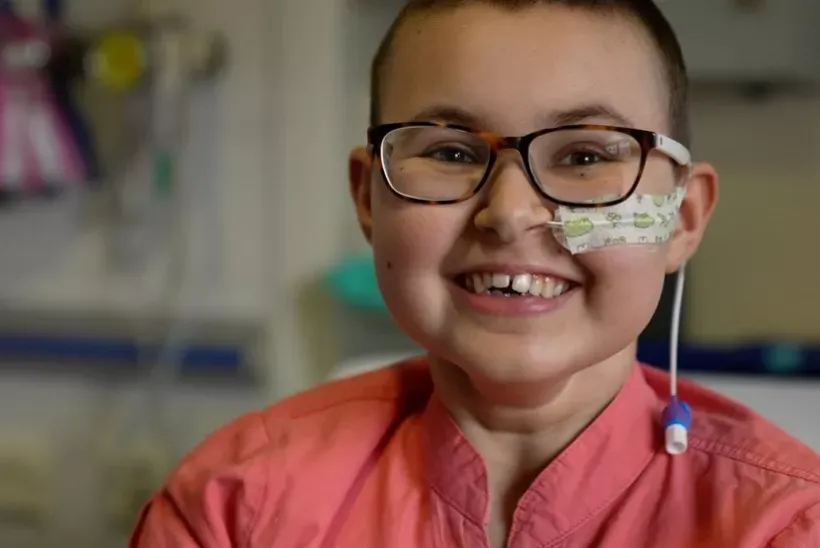GOSH patient receives world-first treatment for her 'incurable' T-cell leukaemia
In May 2022, Alyssa, 13 from Leicester, became the first reported patient in the world to receive base-edited T-cells at Great Ormond Street Hospital for Children (GOSH), in collaboration with the UCL Great Ormond Street Institute of Child Health (UCL GOS ICH), to treat her ‘incurable’ T cell leukaemia.
In 2021, Alyssa was diagnosed with T-cell acute lymphoblastic leukaemia (T-ALL) and received all current conventional therapies for her cancer, including chemotherapy and a bone marrow transplant. Unfortunately her disease came back and there were no further treatment options available as part of routine care.
Alyssa was the first patient to be enrolled onto a new clinical trial and in May she was admitted to the Bone Marrow Transplant (BMT) Unit at GOSH, to receive genetically modified CAR T-cells that originally came from a healthy donor. These cells had been edited using new base-editing technology to allow them to hunt down and kill the cancerous T-cells without attacking each other.
Just 28 days later, she was in remission and went on the receive a second bone marrow transplant to restore her immune system. Now, six-months post-BMT, she is doing well at home recovering with her family and continues her post-BMT follow-up at GOSH.
Base editing and CAR T-cell therapy
It has been more difficult to treat T-cell leukaemia with traditional CAR T-cell therapy because T-cells designed to recognise and attack cancerous T-cells also end up killing each other during the manufacturing process before they can be given as a treatment.
Teams at GOSH and the UCL GOS ICH have therefore been working, using a new genome editing technique called base-editing, to create a new type of CAR T-cell therapy that is able to attack cancerous T-cells. Base editing works by chemically converting single letters of the DNA code (single nucleotide bases) to change the T-cells.
The team used the technique to make multiple changes to healthy donor T-cells, arranged by the Anthony Nolan registry, that have meant cells do not need to be collected from the patient:
- Changing the donor T-cells so that they aren't attacked by the patients own immune system
- Removing a ‘flag’ on the modified T-cells that means they won't attack each other before they can be used as a treatment
- Removing a second ‘flag’ that means the cells are invisible to other cancer treatments
- Adding a way for the modified cells to now recognise and attack cancerous T-cells
The result is edited CAR T-cells that can be given to the patient so that they rapidly find and destroy T-cells in the body, including leukemic T-cells. If successful, the patient then receives a bone marrow transplant to restore their depleted immune system.
This is a great demonstration of how, with expert teams and infrastructure, we can link cutting edge technologies in the lab with real results in the hospital for patients. It’s our most sophisticated cell engineering so far and paves the way for other new treatments and ultimately better futures for sick children. We have a unique and special environment here at GOSH and the UCL GOS ICH that allows us to rapidly scale up new technologies and we’re looking forward to continuing our research and bringing it to the patients who need it most.
Professor Waseem Qasim, Professor of Cell and Gene Therapy at UCL GOS ICH and Consultant Immunologist at GOSH
Alyssa’s story
Since Alyssa got sick with her leukaemia in May last year, she never achieved a complete remission. Not with chemotherapy and not after her first bone marrow transplant. Only after she received her CD7 CAR-T cell therapy and a second bone marrow transplant in GOSH she has become leukaemia free. This is quite remarkable, although it is still a preliminary result, which needs to be monitored and confirmed over the next few months. The entire team here at GOSH are extremely happy for Alyssa and her family and it’s been a privilege to work with them over the past few months. We have been very impressed by how brave she is and nothing makes me happier than seeing her outside the hospital, going back to a more normal type of life.
Dr Robert Chiesa, Consultant in Bone Marrow Transplant and CAR T-cell therapy at GOSH
Alyssa was diagnosed with T-cell leukaemia in May 2021, after a long period of what the family thought were colds, viruses and general tiredness.
While she was treated in Hospitals in Leicester and Sheffield with standard therapies - chemotherapy and a bone marrow transplant - unfortunately the teams were unable to get her cancer under control and into remission.
With the only other option as palliative care, Alyssa and her family extensively discussed this clinical trial with the BMT and CAR T-cell therapy experts and haematology service at GOSH and undertook the decision to be the first to try an experimental treatment for her leukaemia.
Once I do it, people will know what they need to do, one way or another, so doing this will help people – of course I’m going to do it.
Alyssa, 13
Alyssa is the first patient in the world reported to have received a base-edited cell therapy and is currently at home recovering from her treatment. Alyssa and her family are feeling positive that the leukaemia is now undetectable, but know she will need to be monitored closely for some time.
Kiona, Alyssa’s mum said:
The doctors have said the first six months are the most important and we don’t want to get too cavalier but we kept thinking ‘If they can just get rid of it, just once, she’ll be ok.’ And maybe we’ll be right.
Alyssa is very mature and you can forget she is just a child but hopefully this can prove the research works and they can offer it to more children - all of this needs to have been for something. It just feels so senseless. Now we are trying to live between appointments. Alyssa wants to go back to school and that could be a reality soon. She’s already teasing her brother as he has had to go back for Autumn term.
We’re on a strange cloud nine to be honest – it’s amazing to be home
Kiona, Alyssa’s mum

Alyssa is the first patient to receive this treatment during the trial but the team are aiming to recruit up to ten patients with T-cell leukaemia who have exhausted all other treatment options. The Bone Marrow Transplant (BMT) and CAR T-cell therapy teams at GOSH hope that, if the trial is successful, the treatment could be offered to children earlier in their treatment journey. They are also hoping that the technique could be an option for other types of leukaemia.
Support for research
This trial was funded by the Medical Research Council. Support for the broader research programme also comes from Wellcome, Blood Cancer UK and the National Institute of Health and Care Research (NIHR) and the NIHR GOSH Biomedical Research Centre.
Alyssa’s care was led by the BMT and CAR-T research and clinical team at GOSH, with contribution from doctors, nurses and allied professionals.
The cells were manufactured as part of a long-standing research programme led by Professor Waseem Qasim at UCL Great Ormond Street Institute of Child Health, who is also an Honorary Consultant at GOSH.
Thanks to early funding from Great Ormond Street Hospital Children’s Charity (GOSH Charity), Professor Qasim has been a pioneer in developing new CAR T-cell treatments using innovative gene editing techniques and is based at the Zayed Centre for Research into Rare Disease in Children, a partnership between GOSH and UCL GOS ICH.
The research team wish to thank Anthony Nolan for providing the donor T-cells and all of the donors who donate to the register.
At GOSH, we are also developing plans for a new clinical building dedicated to caring for children and young people from across the UK with rare and difficult-to-treat cancers. This will mean our advances in research, care and treatments will be delivered in a specially designed centre focused on the needs of children and their families and on making it easier for us to go even further and faster in developing new and kinder treatments for children with cancer.
This trial is only accepting patients eligible for NHS care. Any patients eligible to receive treatment under the NHS and interested in this trial should approach their specialist healthcare provider

